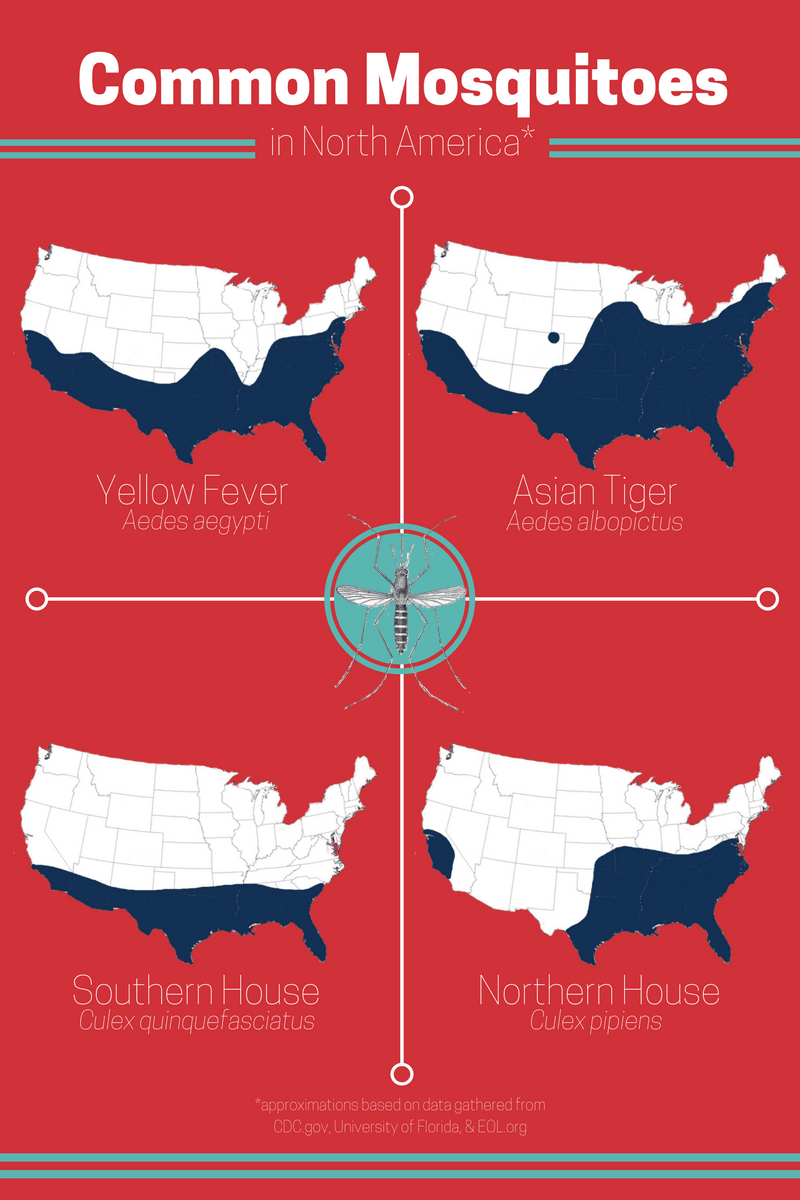Get a free estimate
If you have questions about our services, plans, or pricing we are here for you. Fill out the form below and we will communicate with you by email (and of course provide you with a free estimate).
MARCH 04 2022 /
One of the most well-known (and most feared) springtime nuisances is the mosquito.
While mosquitoes have become famous for carrying the Zika virus in the past couple of years, many people don’t realize that there are other viruses that these annoying pests often carry. Not to mention, these little guys are everywhere.
In fact, there are actually about 174 known species of mosquitoes in and around North America and Mexico.
However, there are four main species found in the United States, all of which are known to carry diseases: Yellow Fever Mosquito (Aedes aegypti), Asian Tiger Mosquito (Aedes albopictus), Northern House Mosquito (Culex pipiens), and Southern House Mosquito (Culex quinquefasciatus).
Learn more about the five most common viruses that these mosquitoes carry below:

What it is: Zika is a virus which some mosquitoes carry, and can transfer to humans through a bite.
The virus itself can cause birth defects, so it is advised that pregnant women exercise extreme caution when it comes to mosquito prevention. There is currently no vaccine available for those infected by Zika.
Symptoms: Main symptoms include fever, rash, joint pain, and red eyes. Those affected may also experience pain in the back of the eyes or muscles, fatigue, fever, chills, loss of appetite, sweating, headache, or vomiting.
Type of mosquito: Aedes species mosquitoes carry this virus, though Aedes aegypti (Yellow Fever Mosquito) are more likely to carry it than Aedes albopictus (Asian Tiger Mosquito).
What it is: Dengue Fever is found mainly in tropical areas of the world. While it is rare in the United States, mosquitoes in the southern U.S. (mainly Florida/areas closest to Mexico), are sometimes found to be carrying the disease. There is currently no vaccine available for those infected.
Symptoms: Main symptoms include rash, high fever, and joint and muscle pain. Those affected may also experience pain in the abdomen, back, back of the eyes, or bones, chills, fatigue, loss of appetite, nausea, vomiting, bleeding, easy bruising, headache, or sore throat.
Type of mosquito: Dengue Fever is carried and spread by the species Aedes, with Aedes aegypti (Yellow Fever Mosquito) being the main carrier.
What it is: Birds are carriers of West Nile virus. When a mosquito bites an infected bird, it will then pass the virus on to any other human or animal it bites.
Luckily, the majority of people bitten by a mosquito carrying West Nile will not experience any symptoms. However, if you do have symptoms, there is currently no vaccine to combat the virus.
Symptoms: About 70% of people who contract West Nile virus do not develop any noticeable symptoms. Some people will experience a fever, headache, body aches, joint pains, vomiting, diarrhea, or rash. Less than 1% of people will develop a serious neurologic illness, with symptoms such as headache, high fever, neck stiffness, disorientation, coma, tremors, seizures, or paralysis.
Type of mosquito: The West Nile virus is carried by the species Culex, which includes the Northern and Southern House Mosquitoes.
What it is: Chikungunya was first discovered in the Americas on the Caribbean islands in 2013. The virus is able to be transported to new areas by infected travelers.
In 2016, there were 175 reported travel-associated cases of Chikungunya throughout the United States. There is currently no vaccine to prevent or medication to treat this virus.
Symptoms: Main symptoms include fever and joint pain. Other symptoms include muscle pain, headache, fatigue, rash, pain in the abdomen, back of eyes, joints, or muscles, chills, and headache.
Type of mosquito: This virus is transmitted through the Aedes species of mosquitoes (Yellow Fever and Asian Tiger mosquitoes).
What it is: There are multiple different types of encephalitis that mosquitoes can contract from birds who are carriers in the United States.
The three main types are St. Louis encephalitis, Eastern equine encephalitis, and LaCrosse virus. Collectively, there are usually around 100 cases of encephalitis reported each year in the U.S. There is currently no vaccine to treat this virus.
Symptoms: Mild cases often cause mild flu-like symptoms, or no symptoms at all. Severe cases may cause muscle pain, muscle weakness, muscle contractions, coordination problems, fatigue, fever, headache, loss of appetite, nausea, vomiting, delirium, hallucination, disorientation, mental confusion or seizures.
Type of mosquito: Both the Aedes and Culex species are capable of carrying certain types of the encephalitis virus.
The best way to protect yourself and your family from mosquito-borne viruses this spring and summer is to take the necessary steps to completely prevent mosquitoes around your home.
Mosquitoes can breed in an area of standing water as small as a bottle cap, so be sure to patrol the area surrounding your home.
Do your best to remove objects such as buckets and toys that might hold water. If you feel that you need professional assistance, be sure to contact the mosquito prevention experts at American Pest to help keep your family safe.